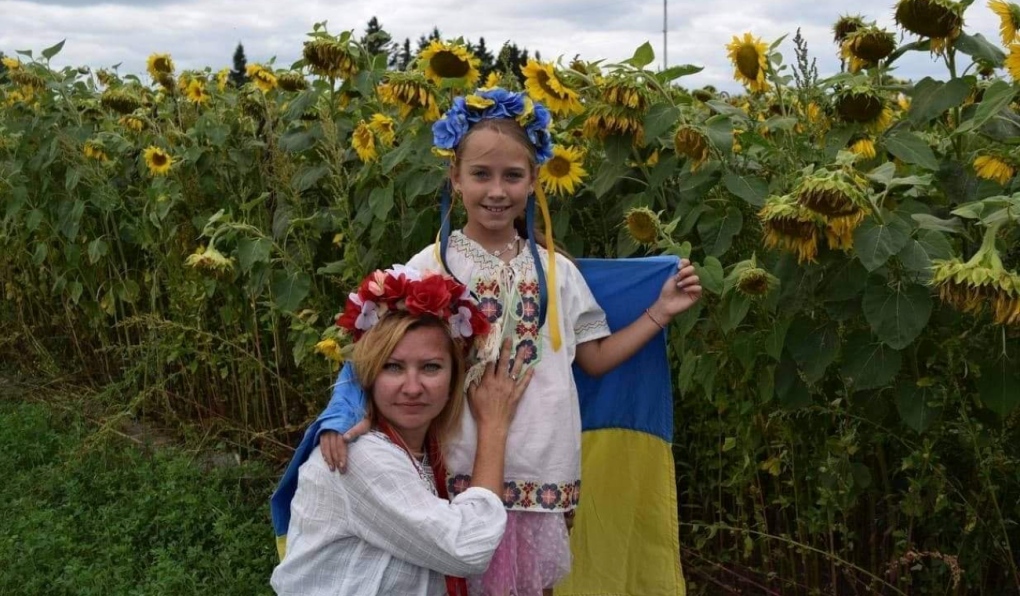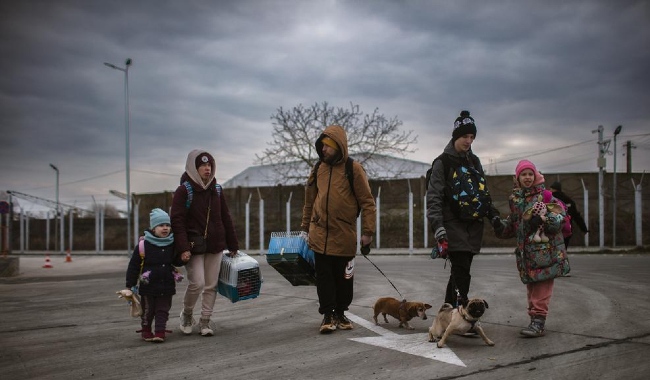Ukrainian doll-making workshop to benefit two families currently residing in North Bay
Two Ukrainian women who escaped Russia’s invasion into their country, now safely settled in North Bay, are leading a traditional doll-making workshop through Nipissing University to help them get back on their feet in their new city.
Olha Ivanchenko and Maryna Bieliaieva and their families are refugees looking for a better life in Canada after Russian forces attacked their war-torn homeland.
Adjusting to life in Canada was a struggle for Ivanchenko at first, she told CTV News. When Russian soldiers advanced into her country, she and her family were forced to flee their home in Kiev.
“My whole world changed,” she said. Olha Ivanchenko and her daughter Milana are adjusting to life in North Bay. (Supplied)Ivanchenko, her daughter Milana, her elderly mother Mariia and their dog’s journey wasn’t easy. Mariia suffered an acute stroke and was bedridden prior to the start of the war.
Olha Ivanchenko and her daughter Milana are adjusting to life in North Bay. (Supplied)Ivanchenko, her daughter Milana, her elderly mother Mariia and their dog’s journey wasn’t easy. Mariia suffered an acute stroke and was bedridden prior to the start of the war.
With support from local Ukrainian volunteers, they were able to find refuge in March once they crossed the border into Poland.
Through the Canadian Ukrainian Authorization for Emergency Travel (CUAET) they obtained their Visas and arrived in Toronto in April with the intention of joining her brother in Philadelphia. But, they were turned away at the U.S. border.
It was then the family connected with Stephen Connor, a Nipissing University history professor, and his wife Anna who opened their home to them.
“The invasion was an attack, not just on Ukraine, but the Ukrainian people. It’s a colonial war of genocide,” said Connor, on why he took in the family.
Sadly, Mariia passed away in August. After her death, Ivanchenko decided she and her daughter would remain in Canada and start a new life in North Bay. It was a difficult choice to make.
“For me it was very hard because I didn’t understand much,” she said.
“It’s a different culture.”
Maryna Bieliaieva along with her husband Andrii, and three children Bohdan, Polina and Daryna lived in eastern and central Ukraine and were constantly battling the realities of war dating back to 2014. Maryna Bieliaieva along with her husband Andrii, and three children Bohdan, Polina and Daryna and their pets fled Ukraine. (Supplied)When Russia’s attack commenced, countless cities fell victim to missile attacks and unfathomable hardships.
Maryna Bieliaieva along with her husband Andrii, and three children Bohdan, Polina and Daryna and their pets fled Ukraine. (Supplied)When Russia’s attack commenced, countless cities fell victim to missile attacks and unfathomable hardships.
The Bieliaievas chose to move abroad with their children and pets for safety.
“It was 5 o’clock a.m. and we listened,” recalled Andrii and Maryna.
“We heard this noise and it was a typical noise of a missile, like a whoosh. Then after that, there was a big explosion.”
From February to August, the family found refuge in Romania, Hungary, Austria, Germany and Denmark. While in Demark, they learned about a new program through the Canadian government for Ukrainians affected by the Russian invasion and began the process of finding salvation in Canada.
They are hoping they can obtain Canadian citizenship and become permanent residents.
On Thursday, both women are leading a session with the university’s Extended Learning Department to craft traditional Motanka dolls at the university student centre. These ancient talismans are believed to protect against evil and represent prosperity.
“One of the objectives of Vladimir Putin and his regime is to destroy Ukrainian culture and them as a people,” explained Connor.
“It really is a way for us as a university community to say ‘We can’t be silent’ and we have to do what we can to speak out.”
The public can join the workshop by registering online. Spots are limited. The proceeds from the workshop will go back to the women and their families who look to re-build their lives in a city that’s welcomed them and that is far away from plotting, aggression and war.
"Most of the people have been really friendly,” said Andrii.
CTVNews.ca Top Stories

Walking pneumonia is surging in Canada. Is this unusual?
CTVNews.ca spoke with various medical experts to find out the latest situation with the typically mild walking pneumonia in their area and whether parents should be worried.
Trump picks Brooke Rollins to be agriculture secretary
U.S. President-elect Donald Trump has chosen Brooke Rollins, president of the America First Policy Institute, to be agriculture secretary.
Joly, Blair condemn anti-NATO protest in Montreal that saw fires, smashed windows
Federal cabinet ministers condemned an anti-NATO protest in Montreal that turned violent on Friday, saying 'hatred and antisemitism' were on display, but protesters deny the claim, saying they demonstrated against the 'complicity' of NATO member countries in a war that has killed thousands of Palestinians.
Retiring? Here's how to switch from saving for your golden years to spending
The last paycheque from a decades-long career arrives next Friday and the nest egg you built during those working years will now turn into a main source of income. It can be a jarring switch from saving for retirement to spending in retirement.
Police thought this gnome looked out of place. Then they tested it for drugs
During a recent narcotics investigation, Dutch police said they found a garden gnome made of approximately two kilograms of MDMA.
'Her shoe got sucked into the escalator': Toronto family warns of potential risk of wearing Crocs
A Toronto family is speaking out after their 10-year-old daughter's Crocs got stuck in an escalator, ripping the entire toe area of the clog off.
Canada's top general takes on U.S. senator in defending womens' role in combat units
Canada's top general firmly rejected the notion of dropping women from combat roles -- a position promoted by president-elect Donald Trump's nominee for defence secretary -- at a security forum underway in Halifax on Saturday.
Ottawa driver fined for hauling thousands of empty cans in trunk of car
Ontario Provincial Police stopped an Ottawa man for dangerously hauling thousands of empty cans from the back of his car.
Canadians are craving to take a 'adult gap year.' Here's why
Canadian employees are developing an appetite for an 'adult gap year': a meaningful break later in life to refocus, refresh and indulge in something outside their daily routine, according to experts.

































